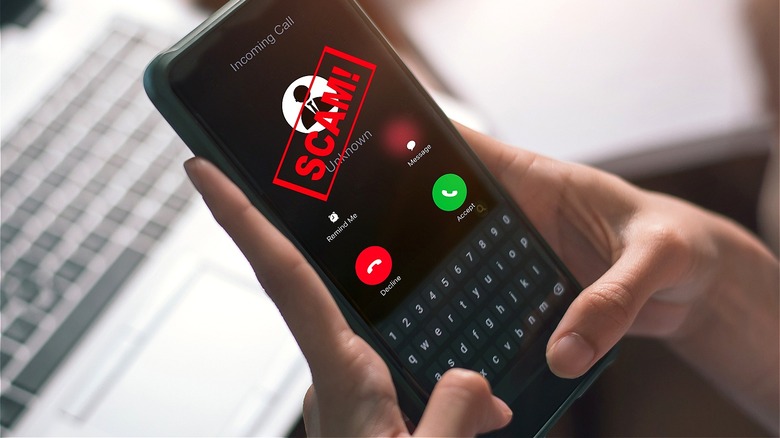Scam Warning: Never Respond If Someone Calls You And Uses These Phrases
There it is, another "unknown number" on your phone. Who could it be? While it's possible the call is legit, there's also a good chance there's a scammer on the other end of the line. After all, there are a lot of scam calls made daily, and phone scammers have tricked people out of an outrageous amount of money. Just how common are scam calls? According to a 2022 report by the National Consumer Law Center and the Electronic Privacy Information Center, there are more than 33 million attempts to defraud Americans via scam robocalls every day. That adds up to more than a billion attempts by scammers to connect with potential victims every month in the United States alone.
With so many scam calls being placed, it's critical to be alert to the possibility that that incoming "unknown caller" is a scammer, too. Phone scammers use a variety of tactics to get information from the people they target, but their motives are pretty much always financial. They run various money scams with the goal of getting you to send them money or getting information from you that will allow them to take your money, open loans or credit cards in your name, etc. While a scammer won't specifically tell you their goal is to scam you, they do often word things in a way that gives away their true intent to those who listen critically.
Common phrases phone scammers use
By learning some of the key things scammers tend to say on the phone, you may be able to spot a caller with nefarious intent before they can trick you into falling for their lies. Never respond if you hear one of the following phrases:
- "Can you hear me?": If a call starts with a "yes" or "no" question, chances are a scammer is trying to record you saying "yes" so they can authorize purchases on your accounts.
- "I'm from the government and need to verify your Social ...": Know that government representatives would never call unexpectedly and ask for your Social Security number or other sensitive information by phone.
- "You've won! All you need to pay is ...": If you really won a contest, you wouldn't be asked to pay for shipping or anything else. This is a tactic scammers use to snag your credit card or bank information.
- "Act now!": Scammers will pressure you to act immediately because they want you to make a snap decision rather than realizing that they're not legit, which will likely happen if they give you time to think.
- "Don't hang up ...": Another common phrase, a scam caller will demand you stay on the line because they don't want you to have an opportunity to fact-check what they're saying and realize they're lying.
- "I'm calling from Amazon...": If a caller claims to be with Amazon and is calling about a suspicious order, they're trying to scam you. Don't fall for it, and don't give them any information about your account.
Protecting your money and identity from phone scams
While some scammers target senior citizens specifically, the reality is that people of any age can become victims of a phone scam. Thus, no matter your age, it's important to be diligent in protecting yourself. Learning about the common phrases these cybercriminals use is a start.
As said, never share personal information with a caller who's using high-pressure tactics or seems otherwise suspicious. Instead, end the call immediately. If you shared personal or financial info with a caller before you realized the call was a scam, take steps to protect yourself, like monitoring your bank accounts and credit card activity. You might also want to consider freezing your credit for a time, especially if you gave the scammer any information that could be used for identity theft.
Further, phone scammers change their tactics regularly, so it's important to report the scam to the appropriate watchdog agencies. That's how these agencies identify widespread scam attempts and alert consumers to be on the lookout. If you think you've been contacted by a phone scammer, report the call to the Federal Trade Commission and the FBI field office in your area. Lastly, if a scammer succeeds in defrauding you, contact your local police department and report it to the FBI via its Internet Crime Compliance Center.


